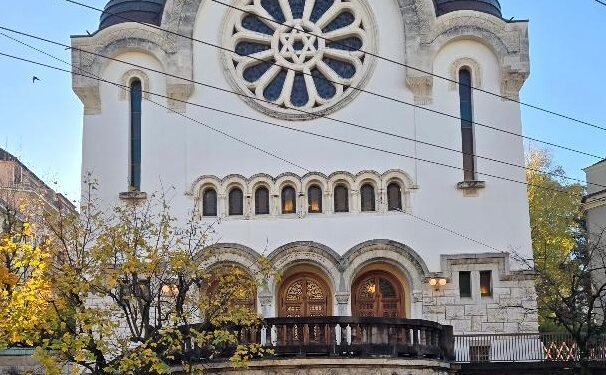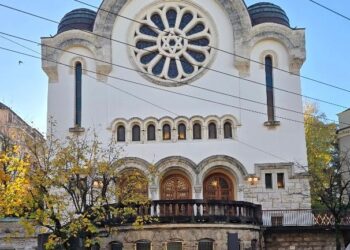Perched on the shimmering shores of Lake Geneva and framed by the snow-dusted Alps, Lausanne is a city that seems to unfold like a story at every turn. Its medieval streets whisper centuries of history, while lakeside promenades pulse with contemporary life. For the Jewish traveler, Lausanne offers a small but remarkably unified and welcoming community centered around its Jewish Center — a place where cultural life, shared meals, and tradition come together in a warm, inviting atmosphere.
Beyond its community treasures, Lausanne enchants at every step. Wander the terraced Lavaux vineyards, a UNESCO World Heritage Site, and feel the weight of generations in every row of vines. Lose yourself in the playful imagination of the Collection de l’Art Brut, or simply pause at a sunlit café, watching the interplay of light on the lake, savoring the effortless blend of French elegance and Swiss precision. Here, history, culture, and community intersect — a city where reflection and inspiration go hand in hand, and every traveler can find a sense of belonging.
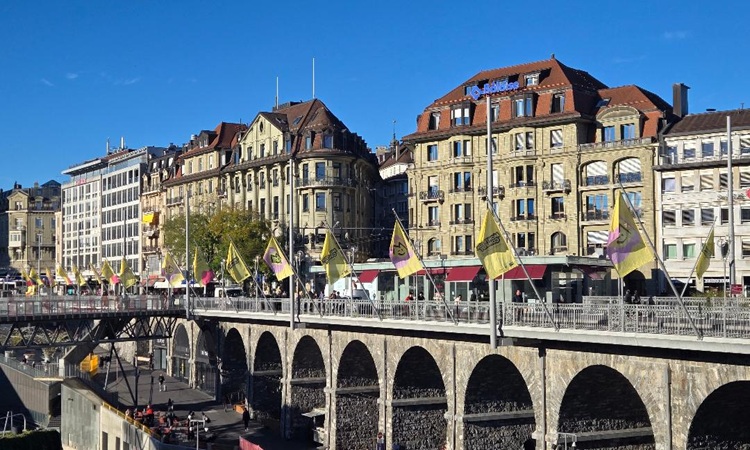
Kosher Living in Lausanne: Tradition and Community
Lausanne’s Jewish community reflects centuries of migration, adaptation, and resilience, offering visitors a living window into European Jewish history. Rabbi Eliezer Shai Di Martino, Rabbin de la Communauté Israélite de Lausanne et du Canton de Vaud (CILV), shared with the New York Jewish Travel Guide how the community has evolved.
“The earliest Jewish presence here was largely Alsatian,” he explained. “Two to three hundred years ago, families arrived from Alsace, many of them working as cattle merchants. That formed the foundation of the community.” Over time, new waves of immigrants reshaped Lausanne’s Jewish landscape. “Today, a significant part of our community has roots in Egypt,” Rabbi Di Martino continued. “They established the Midrash Sephardi at the Benjamin Synagogue. Yet on Shabbat, many of them choose to pray at the Grand Synagogue because they appreciate the Ashkenazi service. It shows how unique our community is—Sephardic background, but very connected to Ashkenazi liturgy.”
During the Second World War, Switzerland offered refuge to only a small number of Jewish families. “Some refugees passed through on their way to the United States or South America, but very few stayed,” Rabbi Di Martino noted. Later, families arrived from Hungary and Romania, and more recently, French Jews have moved to Lausanne, many seeking a safer and more stable environment. “They come mainly because life for Jews in France has become more difficult. Many are professionals with stable careers who choose Switzerland for security and quality of life,” he said.
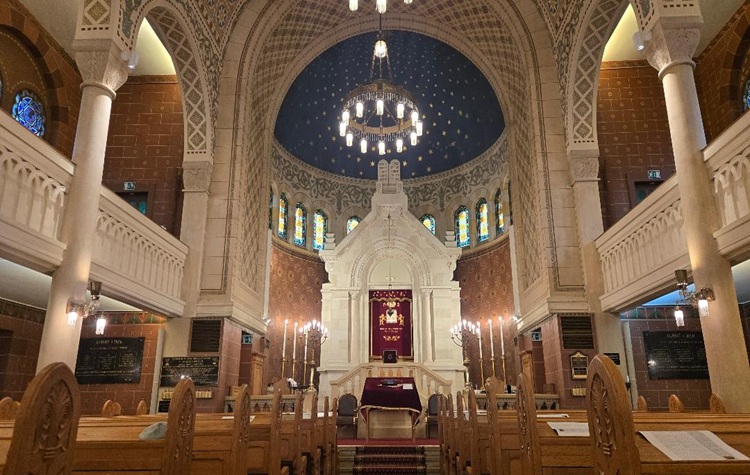
Today, Lausanne counts roughly 600 Jewish families, fewer than 2,000 individuals. Rabbi Di Martino described the evolution of the Sephardic community: “What began as a minyan rooted in Salonika became predominantly Egyptian, and later, Moroccan. Now it is almost entirely Moroccan.” Two Sephardic minyanim continue to serve Rosh Hashanah and Yom Kippur, honoring both historical and North African traditions. “The community is stable and even growing, which is very rare in Europe,” he observed. “Every year, new families join us. Lausanne’s universities attract Jewish students from abroad, and some choose to stay. Here, unlike elsewhere, there is almost no internal migration—people who come, stay.”
While financial stability and strong communal participation mark Lausanne’s Jewish life, challenges remain. Anti-Israel and anti-Jewish demonstrations have occasionally surfaced, particularly on university campuses. The government has responded by providing security support for institutions such as the Grand Synagogue. Community celebrations are carefully planned, with Shabbat dinners held a few times per year, Sukkot meals hosted in a large communal sukkah, and both nights of Passover seders and Rosh Hashanah meals taking place at the synagogue to ensure everyone is included.

Kosher observance in Lausanne is supported not only by the Community Centre but also by local supermarkets such as Coop de Grancy and Coop de Caroline, which stock an expanding range of kosher products. It is also possible to order kosher products for home delivery via their website, www.coopathome.ch. In addition, Rabbi Di Martino noted that there is only one kosher butcher in Lausanne. Across Switzerland, there are just three kosher butchers—in Basel, Zurich, and Lausanne. The Lausanne butcher, owned by Mellul Gregory and called Butcher by Greg, told the New York Jewish Travel Guide, “We provide high-quality kosher meat, received weekly from France, and we also distribute to other cities such as Geneva and Bern. We have been offering catering for residents and visitors since 2017.”
Kosher slaughter is banned in Switzerland, but kosher meat remains accessible because Jewish communities coordinate supervised production across nearby borders and import regularly. Not far from the kosher butcher is a bakery offering kosher chocolate croissants and a variety of breads.
In addition to serving local families, Lausanne welcomes Jewish visitors from across Europe. “In the summer, we see thousands of Hasidim coming to the mountains from Tisha B’Av to Elul,” Rabbi Di Martino said. Many come from London and Antwerp.” This blend of deep-rooted history, multicultural heritage, and vibrant contemporary life makes Lausanne a unique stop for travelers seeking to understand Jewish life in Switzerland today.
From Resistance to Renewal: Rabbi Georges Vadnaï
Rabbi Georges Vadnaï, born György Vadnai in Hungary, joined the French Resistance during World War II, helping Jews escape persecution. After the war, he led Lausanne’s Jewish community from 1948 to 1990, fostering its postwar revival and cultural growth. In 1970, he was named Grand Rabbi, leaving a legacy that continues to shape the city’s Jewish life.
The Synagogue of Lausanne, inaugurated in 1910 through a bequest from Daniel Iffla “Osiris,” stands as a cultural and spiritual landmark. Its Romanesque-Byzantine architecture commands attention, and inside, the sanctuary continues to host services, education programs, and community events. Under Rabbi Vadnaï’s leadership, the synagogue became a hub not just for worship, but for cultural renewal, education, and community cohesion. Today, the Foundation Grand-Rabbin Dr Georges Vadnaï continues his legacy, supporting Jewish education, cultural initiatives, and the preservation of heritage in Lausanne. Visitors can witness how one individual’s moral courage and leadership can help a community thrive against the odds.
Building on Rabbi Vadnaï’s legacy, Lausanne’s Jewish community today thrives under Rabbi Eliezer Shai Di Martino.

The CILV Community Center
The CILV Community Center, housed in a beautiful late nineteenth-century mansion that once served as a hotel and boarding house, is located on Avenue Georgette in the heart of Lausanne, just steps from the synagogue. Yannick Cohen, Secrétaire Général de CILV, told the New York Jewish Travel Guide, “Lausanne is the only community in the region with a full infrastructure where you can find a synagogue, school, mikveh, kosher restaurant, and observe Shabbat.”
Spanning four floors, the center serves as the true hub of community life. It houses the secretariat of the CILV, the office of Youth, directed by Simon Bismuth, who oversees all youth activities and coordinates the Union of Jewish Students, bringing together students and offering a warm welcome to newcomers passing through the city. The center’s kosher kitchen, managed by Ilian Szijardo with Chef Jose Fernandez, the kitchen provides kosher meals to the Jewish school, hospitals, visitors, and tourists. Additional spaces include reception areas and classrooms for Talmud study. Known affectionately by members as “The Center,” the facility lives up to its name, drawing many regulars each day at noon for a strictly kosher meal.
As a cornerstone of community life, the CILV Community Center also supports Jewish education, linking seamlessly to the city’s schools that nurture learning, tradition, and cultural identity for the next generation.
Jewish Education in Lausanne
Lausanne’s Jewish community supports children from early years through middle school through two key institutions.
The École Juive de Lausanne (EJL) offers a full academic curriculum alongside daily Jewish studies, Hebrew, and holiday traditions, blending Swiss educational standards with a nurturing Jewish environment. Gan Menachem, founded in 1980 as Gan Shlomo and Marx School, offers Jewish education from kindergarten through the primary grades. Director Corine Cohen told the New York Jewish Travel Guide, “Our mission is to unite students from various backgrounds and levels of observance in harmony.” Many children begin their journey at Gan Menachem before continuing to EJL, creating a seamless and nurturing path for learning. Together, these two institutions form the heart of Jewish education in Lausanne — close-knit, rooted in tradition, and dedicated to strengthening identity for the next generation
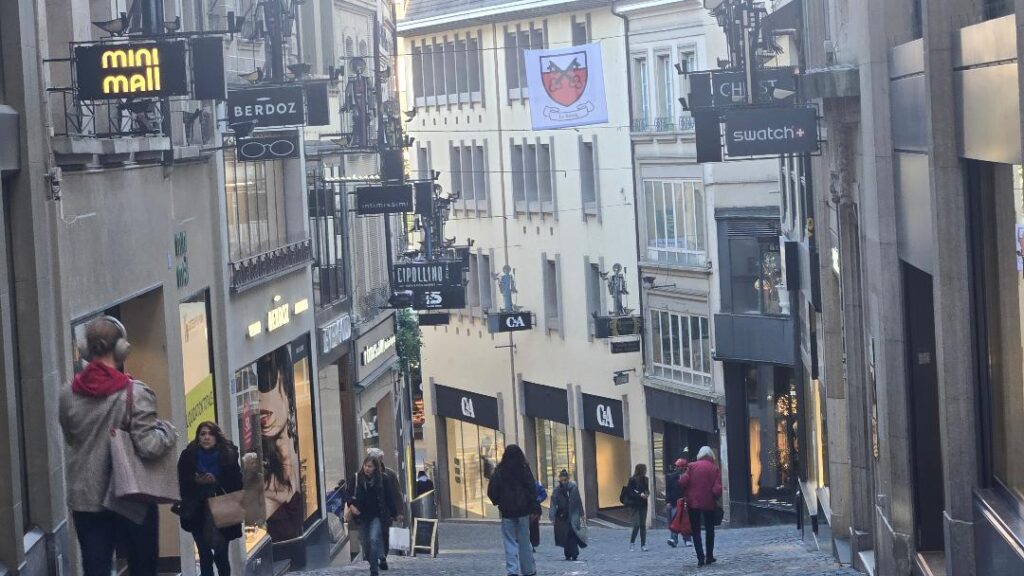
Discovering Lausanne: Guided Cultural Highlights
From the heart of the community and its schools, visitors can also discover Lausanne’s rich cultural and scenic offerings through guided tours led by local experts.
To explore the beauty and key sites of Lausanne, Laura Ragonese, Media & Press Coordinator at Lausanne Tourism, along with local tour guide Adriana, provided an exceptional guided tour.
Highlights included sweeping vistas from the Cathedral, taking in the charming tradition of the night watchman announcing the hour, along with breathtaking views of Lake Geneva and the Alps. A stroll along the lakeside promenade in Ouchy offered a serene perspective of the city, while a chocolate tour showcased some of the finest local chocolatiers and revealed the rich history of Swiss chocolate. For sports enthusiasts, the Olympic Museum is a must-visit, with interactive exhibits bringing the history of the Olympic Games to life for all ages.
Lausanne seamlessly combines breathtaking natural beauty with rich cultural heritage, offering visitors a city where history, faith, and resilience come alive. From the bravery and vision of its Jewish leaders to the vibrant life of the CILV Community Center, from scenic lakeside promenades to world-class museums and artisanal delights, every corner tells a story. For travelers, Lausanne is more than a destination; it is an invitation to explore, reflect, and connect with a living, thriving culture that continues to inspire long after the journey ends.
Story by Meyer Harroch, New York Jewish Travel Guide
Special thanks to the Swiss Tourism Office and to Divine Bonga, of Switzerland Tourism North America, for their hospitality and dedication to showcasing Switzerland’s cultural and Jewish heritage.
Plan Your Visit: https://www.lausanne-tourisme.ch/en/


